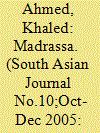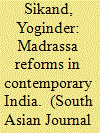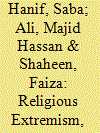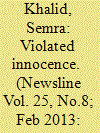| Srl | Item |
| 1 |
ID:
067441


|
|
|
| 2 |
ID:
067442


|
|
|
| 3 |
ID:
068913


|
|
|
| 4 |
ID:
183721


|
|
|
|
|
| Summary/Abstract |
In order to understand the growth of Islamic fundamentalism in Pakistan, it is important to go beyond culturalist and orientalist explanations. As an alternative, this article foregrounds four factors that have been instrumental in projecting fundamentalism to a near-hegemonic position in the country. First, the fact that Pakistan has been imagined as a community of Muslims offers the fundamentalist an edge over secular rivals. This confessional intrinsicality is compounded by an official appeasement and patronage of the fundamentalists. Second, elaborate charity networks offering an ‘alternative society’ that caters to basic needs such as health, education and jobs have helped Islamic fundamentalism expand its outreach during a neoliberal period when the state shunned its welfare role. Third, the radical decline of the Pakistani left spawned a political vacuum that allowed the fundamentalists to become a mainstream platform for the public to vent their anger. Finally, imperialism, in particular the United States, contributed to the growth of fundamentalism in Pakistan in the context of the Cold War. This process apexed during the Afghan Jihad of the 1980s, and it laid the grounds for 9/11 and beyond.
|
|
|
|
|
|
|
|
|
|
|
|
|
|
|
|
| 5 |
ID:
178930


|
|
|
|
|
| Summary/Abstract |
The role of religious seminaries (madrassas) and mainstream schools in developing religious extremism and sympathy toward Taliban (the most dangerous militant group in Pakistan) has received little, if any, scholarly attention. This study has empirically investigated the role, if any, played by religious seminaries (madrassas) and mainstream schools in promoting religious extremism, and especially sympathy toward the Taliban. The study compared attitudes among secondary school students, on the one hand, and madrassa students, on the other, and found school type to be a strong predictor of religious extremism. On the whole, madrassa students tend to hold the most extreme views. However, an individual’s religiosity appears to increase the likelihood of them becoming a Taliban sympathizer, meaning that it is religiosity rather than school type that affects sympathy toward the Taliban. The findings of this study are in line with other recent research, namely that education amplifies frustrated ambitions among individuals who then find gratification in taking extremist attitudes and/or actions.
|
|
|
|
|
|
|
|
|
|
|
|
|
|
|
|
| 6 |
ID:
118701


|
|
|